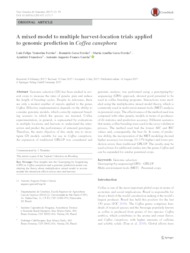A mixed model to multiple harvest-location trials applied to genomic prediction in Coffea canephora.
A mixed model to multiple harvest-location trials applied to genomic prediction in Coffea canephora.
Author(s): FERRÃO, L. F. V.; FERRÃO, R. G.; FERRAO, M. A. G.; FONSECA, A. F. A. da; GARCIA, A. A. F.
Summary: Genomic selection (GS) has been studied in several crops to increase the rates of genetic gain and reduce the length of breeding cycles. Despite its relevance, there are only a modest number of reports applied to the genus Coffea. Effective implementation depends on the ability to consider genomic models, which correctly represent breeding scenario in which the species are inserted. Coffee experimentation, in general, is represented by evaluations in multiple locations and harvests to understand the interaction and predict the performance of untested genotypes. Therefore, the main objective of this study was to investigate GS models suitable for use in Coffea canephora. An expansion of traditional GBLUP was considered and genomic analysis was performed using a genotyping-by-sequencing (GBS) approach, showed good potential to be used in coffee breeding programs. Interactions were modeled using the multiplicative mixed model theory, which is commonly used in multi-environment trials (MET) analysis in perennial crops. The effectiveness of the method used was compared with other genetic models in terms of goodness-of-fit statistics and prediction accuracy. Different scenarios that mimic coffee breeding were used in the cross-validation process. The method used had the lowest AIC and BIC values and, consequently, the best fit. In terms of predictive ability, the incorporation of the MET modeling showed higher accuracy (on average 10–17% higher) and lower prediction errors than traditional GBLUP. The results may be used as basis for additional studies into the genus Coffea and can be expanded for similar perennial crops.
Publication year: 2017
Types of publication: Journal article
Unit: Embrapa Coffee
Observation
Some of Embrapa's publications are published as ePub files. To read them, use or download one of the following free software options to your computer or mobile device. Android: Google Play Books; IOS: iBooks; Windows and Linux: Calibre.
Access other publications
Access the Agricultural Research Database (BDPA) to consult Embrapa's full library collection and records.
Visit Embrapa Bookstore to purchase books and other publications sold by Embrapa.

